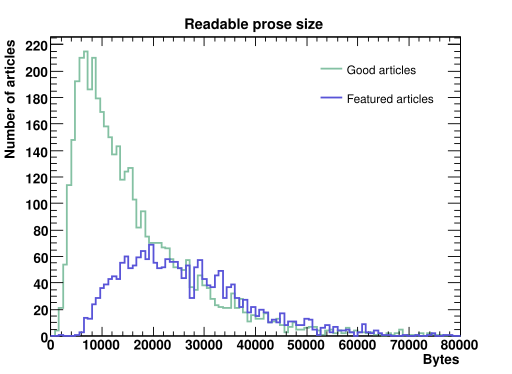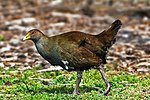Wikipedia:Wikipedia Signpost/2008-10-13/SPV
 |
|---|
|
| ||
| Volume 4, Issue 41 | 13 October 2008 |
About the Signpost |
|
| ||
| (← Prev) | 2008 archives | (Next →) |
|
| ||
|
| |
| Home | Archives | Newsroom | Tip Line | Shortcut : WP:POST/A |
|
| |
Experimental request for adminship ends in failure
In response to continued discussion over the format of
The idea of splitting questions from voting has been suggested before, but received new attention after Kww suggested such a move on the RfA talk page. The perceived benefit of such a move was that such a format would allow candidates to answer all concerns before voting begins, while under the current format, Kww argued, early voters "set the tone of the whole RFA". With a question-and-answer period before voting, it was believed, the candidate might be able to satisfy those early voters, avoiding a quick cascade of opposition.
The format, as presented by Ironholds, included a four-day question-and-answer period, and a four-day voting period. He opened the RfA up for questions on October 7, and within five hours, 18 questions had been asked of him. By the end of the question-and-answer period on October 11, that number had doubled, and when the RfA was closed, it had reached 48 questions in all.
During the voting period, support and opposition was roughly equal. Particularly damning was a comment in opposition by Acalamari, who brought up concerns about incivility, some of which had not been addressed during the question-and-answer period. Nearly all of the users opposing Ironholds' adminship cited those concerns.
After about two-and-a-half days of voting, Ironholds withdrew the RfA on October 13. The withdrawal reflects an answer he had given to Question 27 on the RfA, where he said that he would withdraw if it seemed there would not be consensus for promotion.
Previous attempts to reform RfA through "trial RfAs" have been largely unsuccessful. In April 2007, the vote tallies were briefly removed from RfAs, and two separate RfA formats were introduced, one modeled after the format of deletion debates, and the other modeled after the format of
After his withdrawal, the Signpost asked Ironholds a few questions about his RfA.
What made you decide to have an experimental RfA?
- Well, the general consensus is that many people think RfA is broken, but nobody can agree on what should be done to fix it. The discussion comes around regularly, and this one suggestion caught my eye as quite an interesting idea. I'd been planning on rerunning again anyway (I'd received several nom offers) and this combined with the chance to actually do something to change RfA rather than debate as to the pro's and con's of doing something made it seem an opportune time. My thinking was that even if it failed it would be useful, adding something to the "shit we've tried before" list for when the debate comes around again (which it most assuredly will).
Were you surprised at all to see quite so many questions raised?
- Yes, especially since the idea at the RfA talkpage was to have the questions user-specific rather than generalised copy-and-paste ones and hypothetical policy scenarios. Large numbers of questions wasn't an issue for me, but I can see it putting off other people.
Do you feel that, if you had ran a normal RfA rather than an experiment, you would have passed - or at least done better than you did?
- Not really, to be honest. Most of the opposes were based on Acalamari's oppose and the diffs that went along with it, an oppose posted in the traditional RfA format rather than in the new way. The oppose and reaction to it would've been the same in the old format as he posted it in the new.
Do you feel this new system of RfA would catch on?
- Not really, for two reasons: Firstly, there's too much history behind the old one that makes dislodging it hideously difficult at best. Second, the issue with RfA reform is that those who want to reform don't agree how to do so; the new system would be opposed by not only "RfA is fine" people but also people who want to reform RfA but don't agree on how we're doing it. We are, however, planning on running a pair of additional RfA's to further streamline it all.
Would you ever run for adminship again? If so, what preparation would you undergo beforehand, and would you use the "traditional" layout of RfA (assuming it is still widely used)?
- I honestly don't know if I ever will. The tools would be exceptionally useful in several areas I work in, but the one I really love (writing articles) doesn't at require the tools in any way. I have to weigh up whether gaining the tools is worth the dramah of the RfA and having less time to dedicate to things I currently do. Should I ever run again, however, I'd most likely use the traditional system; it's hard enough to pass already without pissing people off with crazy ideas of 'progress'.
News and notes
Two new developers hired
This week, Wikimedia
Briefly
- The English Wiktionary and French Wiktionary have both reached 1,000,000 entries.
- The Italian Wikipedia has reached 500,000 articles.
- The Portuguese Wiktionary has reached 50,000 articles.
- The Czech Wiktionary has reached 5,000 entries.
- The Czech Wikiversity has reached 500 articles.
- The Galician Wikipedia has reached 40,000 articles.
- The Vietnamese Wikipedia has reached 60,000 articles.
- The Lithuanian Wiktionary has reached 90,000 articles.
- The Ukrainian Wiktionary has reached 7,000 articles.
Dispatches: The latest on featured articles
Promotions and demotions
, Banner year for Featured articles
About one in every 1,130 Wikipedia articles is featured; the ratio of FAs to all Wiki articles has been steadily climbing since February 2007.
During the first nine months of 2008, promotions of FAs have been at about the same rate as for 2007, while demotions at FAR have declined slightly relative to 2007.
During the past two years, average FA promotions were 63 a month; 2008 promotions through September are 64 a month, compared with an average of 42 three years ago.
After
Combining promotions and demotions yields an average growth in FAs of 47 a month over the past two years, and 51 a month over the past year; the increase is due to the lower rate of demotions.
Nominators
Through August 18, the top 10 FA producers of 2008, with eight or more FAs for the year, were (alphabetically):[1]
- Awadewit, specializing in 18th-century British literature.
- Blnguyen (aka YellowMonkey), with articles on cricket and South Vietnamese history.
- Brianboulton, with extensive coverage of polar expeditions and exploration.
- Casliber, the fungus, bird, dinosaur, planet, animal and medical Renaissance man.
- Cla68, specializing in military history articles.
- David Fuchs, writing on video games.
- Hurricanehink, the hurricane expert.
- Jimfbleak, specializing in bird articles.
- Moni3, writing on diverse topics, including the Everglades, film and literature.
- Serendipodous, covering the Solar System.
Amazingly, these 10 editors accounted for one in five of FAs promoted in 2008 through August, at 105 of the 489 promotions.
Categories
| FAs as of September 16, 2008 | Count | % chg since Feb. 23 |
|---|---|---|
| Art, architecture and archaeology | 72 | 10.8% |
| Awards, decorations and vexillology | 26 | 8.3% |
| Biology | 155 | 20.1% |
| Business, economics and finance | 19 | 18.8% |
| Chemistry and mineralogy | 31 | 6.9% |
| Computing | 17 | 0.0% |
| Culture and society | 48 | 20.0% |
| Education | 34 | 13.3% |
| Engineering and technology | 37 | 5.7% |
| Food and drink | 11 | 0.0% |
| Geography and places | 158 | 6.8% |
| Geology, geophysics and meteorology | 90 | 28.6% |
| Health and medicine | 36 | 12.5% |
| History | 154 | 5.5% |
| Language and linguistics | 15 | -11.8% |
| Law | 34 | 17.2% |
| Literature and theatre | 134 | 24.1% |
| Mathematics | 14 | 7.7% |
| Media | 171 | 7.6% |
| Music | 182 | 19.0% |
| Philosophy and psychology | 13 | 8.3% |
| Physics and astronomy | 82 | 22.4% |
| Politics and government | 67 | 8.1% |
| Religion, mysticism and mythology | 44 | 22.2% |
| Royalty, nobility and heraldry | 90 | 20.0% |
| Sport and recreation | 162 | 36.1% |
| Transport | 74 | 57.5% |
| Video gaming | 96 | 33.3% |
| Warfare | 173 | 19.3% |
As of September 16, 2008,[2] the largest featured article categories had at least 150 entries.
- Music
- Warfare
- Media
- Sport and recreation
- Geography and places
- Biology
- History
The smallest categories had fewer than 20 entries.
- Food and drink
- Philosophy
- Mathematics
- Language and linguistics
- Computing
- Business, economics and finance
Relative to categories tallied in the February 25 Dispatch, the fastest growing categories are: Transport; Sport and recreation; Video gaming; Geology, geophysics and meteorology; Literature and theatre; Physics and astronomy; and Religion, mysticism and mythology. Three categories had no growth or a net decrease due to demotions: Language and linguistics; Computing; and Food and drink.
Reviewers
At FAR, great saves by a core group of editors contributed to a record-breaking month, with 17 articles retaining Featured article status during September.
At FAC, reviews have become more specialized, with individual editors tackling specific areas of the
FAC reviewer awards (see
Dedicated FAC and FAR volunteers work to assure that every article nominated receives a thorough review. Without them, FA standards would decline and the FAC and FAR pages would be likely to develop a large backlog as nominators wait for review. It is often thankless work: nominators, please be kind to the reviewers, and if you get a chance to lend a hand, please review some articles as well—we want your expertise too!
Article size

As of October 1, 2008,
- 14 articles were larger than 65KB (roughly 10,000 words); 97 were larger than 51KB.
- 23 articles were smaller than 8KB (about 1,250 words); 100 were smaller than 10KB.
Average size at 25KB has not changed relative to a year ago for 1,721 featured articles. At that time:
- 9 articles were larger than 65KB; 46 articles were larger than 51 KB
- 16 were smaller than 8KB; 71 were smaller than 10KB.
Hence, average "readable prose size" has not changed, while the number of FAs of both the larger and smaller size-ranges has increased. (Several of the largest FAs have grown since passing
At around at least the average size of a FA (25KB), the number of
References
- ^ List of Wikipedians by featured article nominations/2008 as of August 18, 2008
- ^ Wikipedia:Featured articles as of September 16, 2008
- ^ User:Dr pda/Featured article statistics as of October 1, 2008
Features and admins
Administrators
Seven users were
).Bots
Eight bots or bot tasks were approved to begin operating this week: MPUploadBot (task request), STBot (task request), ArticleAlertbot (task request), Nomenclaturebrowser (task request), TinucherianBot II (task request), OKBot (task request), MifterBot I (task request), and AnomieBOT (task request).
MPUploadBot is an administrative bot that continuously searches for images included on the Main Page, and if the images are on Wikimedia Commons and unprotected, the bot uploads a copy of the image locally, and protects it for the duration of its usage on the Main Page. After it is removed from the main page, the bot deletes the local copy.
Featured pages
Fourteen articles were promoted to
Eighteen
With the eighteen lists promoted this week, the number of featured lists has exceeded 1,000; as of press time, there are 1,006 featured lists.
One
No
The following featured articles were displayed on the Main Page this week as Today's featured article: Midtown Madness, Niagara Falls Suspension Bridge, Massospondylus, Akhtar Hameed Khan, Cleveland Street scandal, Grass Fight, and Trafford.
Former featured pages
Four
No
Featured media
The following featured pictures were displayed last week on the Main Page as picture of the day: Crepuscular rays, Dungeness crab, Arches National Park, Geocentric model of the universe, Tristan und Isolde, Charles Griffin, and Culex mosquitoes.
Five
|
| Flag song | (nom) |
|
| Morgenlich leuchtend im rosigen Schein | (nom) |
|
| Lillian Russell - Come Down Ma Evenin' Star | (nom) |
|
| Shine On, Harvest Moon | (nom) |
|
| Pleurez, pleurez, mes yeux | (nom) |
One additional sound had been promoted last week, but was accidentally left out of the list:
|
| O soave fanciulla | (nom) |
No featured
Eleven pictures were promoted to featured status this week and are shown below.
-
Brown Spider Monkey
-
Tasmanian Native-hen
-
William-Adolphe Bouguereau's L'Innocence
-
Crochet tablecloth
-
Richmond Bridge, Tasmania
Bugs, Repairs, and Internal Operational News
This is a summary of recent technology and site configuration changes that affect the English Wikipedia. Note that not all changes described here are necessarily live as of press time; the English Wikipedia is currently running version 1.43.0-wmf.10 (093754a), and changes to the software with a version number higher than that will not yet be active. Configuration changes and changes to interface messages, however, become active immediately.
Fixed bugs
- <ref/> tags that refer to previous references can now be created with {{#tag:}}. (r41669, bug 15770)
- #iferror: has been improved to catch more sorts of errors. (r41881, bug 15730)
- When a template is removed from a cascade-protected page and the template transcluded a category onto that page, the category is now removed from the page. (r41923, bug 15846)
- The special-pages dropdown is now in the correct place on the Nostalgia skin. (r41940, bug 15928)
- A page's content is no longer silently overwritten if a user has an edit conflict with another user, then an edit conflict with themself when they try to fix it (which could, for instance, happen due to clicking on the 'back' button during the save). (r42034, bug 15991)
- A user no longer overwrites the entire page when trying to edit a section and clicking on 'save' before the edit page is fully loaded. (r42037, bug 1181)
- A large number of SVG-related bugs were fixed by the upgrade of the SVG-rendering code used on the MediaWiki servers; more fonts are now available for SVG as well.
New features
- The "templates used on this page" list at the very bottom of the edit screen now has edit links for those templates which are editable by the user viewing them. (r41829, bug 11904)
- Special:BlockIP now has a link to the contributions of the user who will be blocked. (r41831, bug 15432)
- Images now take their alt text from their alt= parameter, if one is present. (r41837, bug 368)
- Special:RecentChangesLinked can now be transcluded. (r41861, bug 13179)
- Searching Special:IPBlockList now reveals rangeblocks that block a particular IP, as well as blocks directly on that IP. (r41902, bug 14634)
Ongoing news
- Internationalisation has been continuing as normal; help is always appreciated! See mw:Localisation statistics for how complete the translations of languages you know are, and post any updates to bugzilla or use Betawiki.
The Report on Lengthy Litigation
The
New case
- Abtract and Collectonian, involving an editing dispute between the two. A temporary injunction has passed in the case, declaring administrator-imposed editing restrictionsto remain in effect until a decision is reached, and directing the users to submit evidence speedily, so that the Committee can swiftly introduce a decision that would supersede the injunction.
Evidence phase
- and other editors. Piotrus denies the allegations against him, and has suggested that the case may be a deliberate attempt to drive him from the site.
Voting phase
- , inter alia), alleging that he misused the tool. A finding of fact with the support of six arbitrators find that Lar's conduct "fell within the acceptable range of CheckUser discretion", and remedies reminding users to bring similar issues to appropriate dispute resolution processes rather than "public invective", and reminding CheckUser operators to abide strictly to the Wikimedia Foundation's privacy policy, have the support of five arbitrators, with none opposing.
Motion to close
- biographies of living persons policy, have the support of seven to eight arbitrators. Remedies restricting Jossi and MZMcBride from unprotecting or reducing the edit-protection status of a biography of a living person for 90 days have the support of five arbitrators, with two abstaining (meaning that the remedies have a majority). A motion to close is active on the case, currently supported by four and opposed by FloNight; the case is unlikely to close until voting has completed on a few points.









